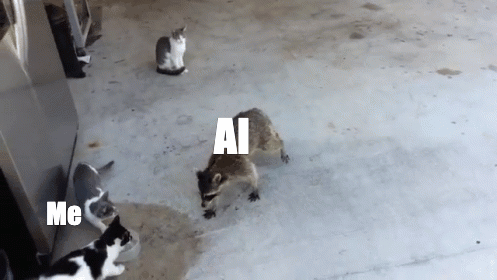Data Engineering in 2025 and Beyond: Navigating Opportunities and Challenges
What does 2025 mean for your role as a data engineer? Find out how you can adapt and thrive in a changing landscape.
Happy New Year, curious reader,
The data engineering landscape is undergoing transformation. AI now automates tasks, helping organisations work more efficiently. Companies are also rethinking hiring due to cost pressures.
Understanding these changes is critical for staying ahead. In this article, you and I will explore the forces driving this evolution, the challenges and opportunities they present, and actionable strategies to help you thrive in 2025 and beyond.
📢 Announcements
Before we start, here are some quick announcements from me.
As promised last week, starting later today, you will receive one additional email on the first of each month. This is part of a special Level-Up series I designed to help you speed up your career growth in data engineering.
While everybody will have some benefit from this series, only paid readers will be able to access all the projects, templates and frameworks in the series.
I have chatted with some great people in the data community lately. I will post one monthly interview with one of these inspirational people very soon. Those won't be the usual interviews about them. We will discuss how you can take the most out of your career in data.
Last but not least, starting in February, I’ll be increasing the subscription price for the newsletter to €10/month or €100/year. Existing paid readers won’t see any changes—your current pricing will remain the same, but feel free to reach out if you have any concerns. If you’ve been considering subscribing, now is the perfect time to lock in the current rate before the change takes effect.
🔍 Understanding the Key Drivers of Change
🤖 AI: Making or Breaking Data Engineering Careers
AI is transforming the way data engineers work. Although not perfect, tools can generate code, optimise pipelines, and even debug issues.
Traditionally, time-consuming tasks like coding and troubleshooting have become faster and more efficient.
While it boosts productivity, it also disrupts traditional roles—particularly for junior engineers.
Tasks that once served as entry points for early-career professionals are now being automated. Companies may see AI as a cost-effective alternative to hiring juniors, especially for simple ETL jobs.
✂️ Cost-cutting and the Shift to Flexible Hiring
The traditional model of large, permanent data teams is under pressure.
Companies are shifting to leaner staffing models, opting for contractors and consultants who can provide expertise on demand.
This approach helps organisations reduce costs and scale resources up or down based on immediate needs.
💼 Prediction #1: The Changing Job Market
The job market for junior data engineers is shifting. The advancements in artificial intelligence are driving a big part of this change.
AI tools like Cursor, Windsurf, and Cline are growing in popularity. Cursor alone generates $65 million in ARR and is valued at $2.6 billion.
These tools are reaching a level of sophistication where they can write code, optimise workflows, and automate processes that were traditionally the domain of junior team members.
This shift affects not only junior roles but data teams as a whole. Smaller, more focused teams are emerging, prioritising alignment with business objectives.
As a result, the traditional silos between data engineers, analytics engineers, and analysts are starting to dissolve.
Who knows, maybe in the near future, these roles may converge under a single title, such as "data specialist."
This evolution reflects the growing demand for professionals who can bridge technical expertise with business acumen.
🤔 What does this mean for you?
This isn’t necessarily bad news for junior data engineers, but it represents a different kind of challenge.
Technical skills alone won’t suffice to secure a position. While proficiency in Python, SQL, and foundational data tools remains essential, understanding the broader business context of your work is becoming just as critical.
If you’re an aspiring or early-career data engineer, this shift means you’ll need to expand your focus beyond technical proficiency.
Companies will no longer just look for someone to build a pipeline. They will look for people who understand why the pipeline is needed in the first place.
This requires you to think holistically about the systems you create and how they fit into the organisation’s broader strategy.
You’ll also need to adapt to the blurred lines between data roles. Expect to contribute not only to the technical aspects of data engineering but also to tasks traditionally handled by analysts or analytics engineers.
For example, you might work on data visualisations or directly support decision-making processes, even if those responsibilities aren’t explicitly part of your job title.
Finally, the shrinking size of data teams means you’ll likely work more closely with business stakeholders. Communicating effectively with non-technical colleagues and understanding their needs will be vital.
Your ability to bridge the gap between technical solutions and business outcomes will make you an indispensable team member.
🚀 How can you benefit?
To position yourself for success, focus on developing a balanced skill set combining technical depth and business insight.
Start by strengthening your understanding of core data engineering tools like Python, SQL, and cloud platforms. These skills will remain the foundation of your work.
Next, invest time in learning about business processes. Study how data impacts decision-making and explore frameworks like KPIs and metrics.
This knowledge will help you align your technical solutions with business objectives. Consider taking courses or reading case studies that show how successful companies use data to solve problems and drive growth.
Finally, embrace opportunities to broaden your role. Volunteer for projects that require you to engage with stakeholders or collaborate across teams. Practice explaining technical concepts in simple terms, and look for ways to demonstrate the tangible value of your work.
By building both technical and business skills, you’ll adapt to the changing job market and position yourself as a valuable asset in any organisation. This balanced approach will prepare you to thrive as a data engineer in 2025 and beyond.
🛠️ Prediction #2: The Shifting Role of Data Tools
The modern data stack has been a cornerstone of data engineering for years. It champions the principle of using specialised tools for distinct tasks—each designed to do one thing exceptionally well.
Tools like dbt and Fivetran embody this approach, offering modular solutions that help teams build pipelines, transform data, and manage integrations.
While the idea is sound, its execution has revealed hidden costs that are starting to challenge its dominance.
Individually, these tools aren’t prohibitively expensive. However, when combined, they introduce significant complexity.
Teams must learn multiple technologies, create custom integrations to connect them and spend effort ensuring their stability.
The unpredictable pricing models of tools like Fivetran and dbt Cloud only add to the problem, making it harder for organisations to budget effectively.
Another issue lies in the open-core model that many of these tools adopt.
Open-core solutions work well for technical teams, like the one I lead, familiar with configuring complex systems. But once these teams have set up the free versions, they often find little reason to upgrade to the paid tiers.
Take dbt Cloud, for example. While it offers convenience features, it doesn’t significantly extend the capabilities of the open-source dbt Core. This dynamic makes it harder for companies offering open-core tools to sustain their business models.
As a result, the industry will shift toward larger, more integrated platforms built on a freemium model. These platforms combine the best aspects of modern data stack tools into cohesive solutions.
By including pre-configured integrations, these platforms reduce the need for teams to spend time glueing components together. They offer a more predictable pricing structure while simplifying maintenance and operation.
🤔 What does this mean for you?
For data engineers, this trend signals a shift in focus. While tools like dbt and SQLMesh are here to stay, the days of stitching together a dozen specialised tools may be numbered.
Organisations will prioritise platforms that consolidate functions like ingestion, transformation, and reporting into a single, seamless ecosystem.
This shift means you’ll need to broaden your expertise. Instead of becoming an expert in niche tools, focus on understanding integrated platforms and how they can streamline workflows.
Companies will value engineers who can quickly adapt and optimise these new solutions to deliver measurable outcomes.
Additionally, the emphasis on reducing maintenance costs will likely lead to smaller data teams. Engineers who can handle technical and strategic tasks will be in high demand.
🚀 How can you benefit?
To thrive in this evolving environment, start by learning the ins and outs of how existing tooling works. Don't just learn how to use them, but also what happens under the hood.
At the same time, hone your ability to evaluate and optimise tools. Organisations will still rely on specialised tools like dbt or SQLMesh, but they’ll look for engineers who can identify the best ways to integrate them into larger systems.
Your ability to simplify workflows, automate repetitive tasks, and minimise maintenance overhead will make you a valuable asset.
Finally, stay adaptable. As the role of standalone modern data stack tools diminishes, the skills you develop in working with integrated platforms will position you for success.
Focus on delivering value and improving ROI for your organisation, whether that’s through better-maintained systems or more efficient data processes.
🧑💼 Prediction #3: A Shift in Hiring Models
The way companies hire data engineers is evolving.
With AI improving efficiency and cost pressures driving decisions, organisations are moving away from large, permanent teams.
Instead, they are leaning toward flexible staffing models, hiring contractors, freelancers, or consultants for specific projects.
You and I can already see organisations leaning towards freelancers and consultants more often. Communities like TFA by SeattleDataGuy are booming because businesses want flexibility.
This shift is driven by practicality. Businesses want to avoid overstaffing and underutilisation, which are common issues with permanent teams.
Hiring on-demand experts gives them the flexibility to scale up or down as needed.
However, this approach also means job security for full-time roles may decrease. Competition for permanent positions could become more intense.
🤔 What does this mean for you?
If you’re used to the stability of a permanent role, this trend might feel unsettling. But it’s also an opportunity to rethink your career path.
Freelancing or consulting can offer higher earning potential, diverse experiences, and the chance to work on cutting-edge projects. These roles often provide exposure to multiple industries, enabling you to broaden your expertise and network.
However, this model requires a proactive mindset. Freelancers and consultants must excel at self-promotion, client management, and delivering results quickly.
You’ll need to take ownership of your professional development, ensuring your skills stay relevant as technologies and client needs evolve.
🚀 How can you benefit?
Consider whether freelancing or consultancy aligns with your career goals.
If it does, start building a portfolio that showcases your expertise. Highlight projects where you’ve delivered measurable impact or tackled unique challenges.
Additionally, strengthen your business skills. Learn how to pitch your services, negotiate contracts, and manage client relationships. These abilities are critical for establishing a successful freelance or consulting career.
If you prefer permanent roles, focus on demonstrating your value to employers. Show how you can contribute to business outcomes and adapt to evolving needs. Positioning yourself as indispensable will increase your job security, even as hiring models shift.
If you have enjoyed the newsletter so far, please show some love on LinkedIn and Threads or forward it to your friends. It really does help!
💭 Final Thoughts
The future of data engineering is filled with opportunities and challenges. But amidst all the change, it’s essential to recognise that some things will remain constant.
As much as AI and new tools promise to revolutionise workflows, the fundamentals of data engineering will continue to be the foundation of success.
Python and SQL, for instance, have long been staples of the field. We will continue seeing companies trying to kill them and fail.
As a data engineer, mastering fundamentals ensures you’re equipped to adapt to whatever changes the industry throws your way. You will also know what matters and what is a gimmick.
The same principle applies to data quality. Organisations may invest in sophisticated tools to address quality issues, but tools are not a substitute for sound processes.
The root of most data quality problems lies in workflows and communication—not technology. Engineers who understand this and focus on building robust processes will have an edge over those who rely solely on tools.
As you navigate 2025, stay open to new technologies and approaches. Embrace AI, explore integrated platforms, and develop new skills. But don’t let shiny new trends distract you from what truly matters.
Strong fundamentals, thoughtful processes, and a deep understanding of the business impact of your work will remain key to your success.
🏁 Summary
Data engineering in 2025 will be a blend of change and continuity.
AI will automate repetitive tasks, allowing engineers to focus on solving complex problems and designing efficient systems. However, this shift will raise the skill bar for entry-level roles, demanding stronger capabilities from aspiring engineers.
At the same time, companies are adopting flexible hiring models, favouring consultants and freelancers for their expertise. This creates new opportunities for engineers who can adapt quickly and deliver value.
Despite these changes, the fundamentals of data engineering—skills like Python, SQL, and strong data processes—will remain critical.
While new trends emerge, engineers who focus on these timeless principles will continue to succeed.
Balancing adaptability with a solid foundation will be the key to thriving in 2025 and beyond.
Until next time,
Yordan
😍 How Am I Doing?
I love hearing you. How am I doing with Data Gibberish? Is there anything you’d like to see more or less? Which aspects of the newsletter do you enjoy the most?
Use the links below, or even better, hit reply and say “Hello”. Be honest!







